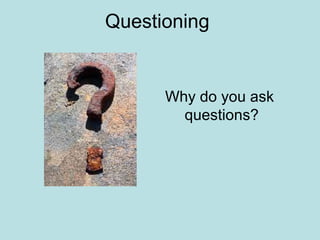
Effective questioning
- 1. Questioning Why do you ask questions?
- 2. 2 • arouse curiosity • stimulate interest in the topic • clarify concepts • emphasize key points • enhance problem-solving ability • encourage students to think at higher cognitive levels • motivate student to search for new information • ascertain students’ knowledge level to aid in modifying instruction
- 3. 3 Type 1- Factual info/ single response What is 2+2? How does a dog stop a DVD player?
- 4. 4 Type 2- Description What did you do? What happened? What did you observe happening?
- 5. Type 3- explanation required How would you explain this? What were some of the causes that led to...?
- 6. 6 Type 4- proving a point What kind of evidence did you find? What makes you think that...?
- 7. 7 Type 5- Compare/ draw on prior learning How does that compare to...? What did other people discover or say about ...?
- 8. Types of probing questions: Extension Require students to elaborate on the response given to an earlier question. Such questions indicate to the learner that the original response was in the right direction but was not adequate. Clarification Useful when the student’s response is unclear or incomplete. Justification Require the learner to provide rationale for the previously- given response. Useful in providing insights into thinking and reasoning processes of students and revealing errors in these processes. Prompting Useful when students do not respond to the original question Redirection Used to elicit a variety of opinions during problem-solving sessions or discussions.
- 9. Questions and Bloom • Whatever type of assessment we use the tasks/ questions will be different according to level. • Remember Bloom and mastery/ developmental objectives? • We need to consider the breadth and depth of our tasks/ questions- Refer to PIGS handout.
- 11. The 3 Little Pigs http://www.youtube.com/watch?v=WW_dBQPAeDY
Editor's Notes
- There are many ways to ask a question and some ways are better than others. Thinking about the types of questions that could be asked or even preparing specific questions prior to teaching a lesson will often lead to more effective classroom discussions. It is important to think of thoughtful questions that encourage learners to think critically about the concept being learned. In order to be successful at effectively questioning learners, teachers and trainers must be aware of the type of questions they are directing to the students and use effective questioning practices. This applies equally to tasks given to learners to take away.
- There are many ways to ask a question and some ways are better than others. Thinking about the types of questions that could be asked or even preparing specific questions prior to teaching a lesson will often lead to more effective classroom discussions. It is important to think of thoughtful questions that encourage learners to think critically about the concept being learned. In order to be successful at effectively questioning learners, teachers and trainers must be aware of the type of questions they are directing to the students and use effective questioning practices. This applies equally to tasks given to learners to take away.
- There are many ways to ask a question and some ways are better than others. Thinking about the types of questions that could be asked or even preparing specific questions prior to teaching a lesson will often lead to more effective classroom discussions. It is important to think of thoughtful questions that encourage learners to think critically about the concept being learned. In order to be successful at effectively questioning learners, teachers and trainers must be aware of the type of questions they are directing to the students and use effective questioning practices. This applies equally to tasks given to learners to take away.
- There are many ways to ask a question and some ways are better than others. Thinking about the types of questions that could be asked or even preparing specific questions prior to teaching a lesson will often lead to more effective classroom discussions. It is important to think of thoughtful questions that encourage learners to think critically about the concept being learned. In order to be successful at effectively questioning learners, teachers and trainers must be aware of the type of questions they are directing to the students and use effective questioning practices. This applies equally to tasks given to learners to take away.
- There are many ways to ask a question and some ways are better than others. Thinking about the types of questions that could be asked or even preparing specific questions prior to teaching a lesson will often lead to more effective classroom discussions. It is important to think of thoughtful questions that encourage learners to think critically about the concept being learned. In order to be successful at effectively questioning learners, teachers and trainers must be aware of the type of questions they are directing to the students and use effective questioning practices. This applies equally to tasks given to learners to take away.
- There are many ways to ask a question and some ways are better than others. Thinking about the types of questions that could be asked or even preparing specific questions prior to teaching a lesson will often lead to more effective classroom discussions. It is important to think of thoughtful questions that encourage learners to think critically about the concept being learned. In order to be successful at effectively questioning learners, teachers and trainers must be aware of the type of questions they are directing to the students and use effective questioning practices. This applies equally to tasks given to learners to take away.